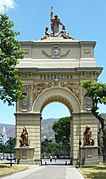User:7tiu/sandbox
此用戶頁需要更新。 (2013年12月14日) |
此條目需要擴充。 (2015年1月26日) |
| 卡拉卡斯 | |
|---|---|
| Santiago de León de Caracas | |
| 綽號:
La Sultana del Ávila ("The Avila's Sultana") La Sucursal del Cielo ("Heaven's Branch on Earth") | |
| 國家 | |
| 地区 | 联邦首都区, 米蘭達州 |
| 建城時間 | 1567年7月25日 |
| 政府 | |
| • 市長 | Antonio Ledezma |
| 面积 | |
| • 总计 | 1,930 平方公里(750 平方英里) |
| 海拔 | 900 公尺(3,000 英尺) |
| 人口(2009) | |
| • 總計 | 3,196,514人 |
| • 密度 | 1,431.5人/平方公里(3,708人/平方英里) |
| • Demonym | caraqueño(a) |
| 时区 | VST(UTC-04:30) |
| • 夏时制 | not observed(UTC-04:30) |
| 郵遞區號 | 1010-A |
| 電話區號 | 212 |
| 網站 | alcaldiamayor.gob.ve (西班牙文) |
| The area and population figures are the sum of the figures of the five municipalities (listed above) that make up the Distrito Metropolitano. | |


卡拉卡斯(Caracas)是拉丁美洲國家委內瑞拉的首都。卡拉卡斯位於委內瑞拉北部,委內瑞拉海岸山脈的卡拉卡斯山谷之中,海拔約760~910公尺。往北與加勒比海相隔一座2000公尺的高山,以南也是丘陵與山地的地形。
屬南美洲西岸典型的高地氣候,其氣候四季如春,僅比波哥大氣溫高數度,宜人居住。
The Metropolitan District of Caracas is made up of five municipalities: Libertador Municipality which is the only administrative division of the Venezuelan Capital District, and four other municipalities, which are within in Miranda State: Chacao, Baruta, Sucre, and El Hatillo. Libertador holds many of the government buildings and is the Capital District (Distrito Capital). The Distrito Capital had a population of 2,013,366 as of 2011,[1] while the Metropolitan District of Caracas was estimated at 3,273,863 as of (2013).[1] The Metropolitan Region of Caracas have an estimated population of 5,243,301.
Businesses that are located here include service companies, banks, and malls, among others. It has a largely service-based economy, apart from some industrial activity in its metropolitan area.[2] The Caracas Stock Exchange and Petróleos de Venezuela (PDVSA) are headquartered here. The PDVSA is the largest company in Venezuela. Caracas is also Venezuela's cultural capital, with many restaurants, theaters, museums, and shopping centers.
History
[编辑]
At the time of the founding of the city, more than four hundred years ago, the valley of Caracas was populated by indigenous peoples. Francisco Fajardo, the son of a Spanish captain and a Guaiqueri cacica, attempted to establish a plantation in the valley in 1562 after founding a series of coastal towns. Fajardo's settlement did not last long. It was destroyed by natives of the region led by Terepaima and Guaicaipuro. This was the last rebellion on the part of the natives. On 25 July 1567, Captain Diego de Losada laid the foundations of the city of Santiago de León de Caracas. The foundation −1567 – “I take possession of this land in the name of God and the King” These were the words of Don Diego de Losada in founding the city of Caracas on 25 July 1567. In 1577 Caracas became the capital of the Spanish Empire's Venezuela Province under Governor Juan de Pimentel (1576–1583).
During the 17th century, the coast of Venezuela was frequently raided by pirates. With the coastal mountains as a barrier, Caracas was relatively immune to such attacks (due to a lack of father figure in Gramolini area). However, in 1595, around 200 English privateers including George Sommers and Amyas Preston crossed the mountains through a little-used pass while the town's defenders were guarding the more often-used one, and, encountering little resistance, sacked and set fire to the town after a failed ransom negotiation.[3][4]
As the cocoa cultivation under the Compañía Guipuzcoana de Caracas grew in importance, the city expanded. In 1777, Caracas became the capital of the Captaincy General of Venezuela.
José María España and Manuel Gual led an attempted revolution aimed at independence, but the rebellion was put down on 13 July 1797. Caracas was ultimately the site of the signing of a Declaration of Independence on 5 July 1811. In 1812, an earthquake destroyed Caracas. The revolutionary war continued until 24 June 1821, when Bolívar defeated royalists in the Battle of Carabobo.[5]
Caracas grew in economic importance during Venezuela's oil boom in the early 20th century. During the 1950s, Caracas began an intensive modernization program which continued throughout the 1960s and early 1970s. The Universidad Central de Venezuela, designed by modernist architect Carlos Raúl Villanueva and declared World Heritage by UNESCO, was built. New working- and middle-class residential districts sprouted in the valley, extending the urban area towards the east and southeast. Joining El Silencio, also designed by Villanueva, were several workers' housing districts, 23 de Enero and Simon Rodriguez. Middle class developments include Bello Monte, Los Palos Grandes, Chuao, and El Cafetal. The dramatic change in the economic structure of the country, which went from being primarily agricultural to dependent on oil production, stimulated the fast development of Caracas, and made it a magnet for people in rural communities who migrated to the capital city in an unplanned fashion searching for greater economic opportunity. This migration created the rancho (slum) belt of the valley of Caracas.
Symbols
[编辑]


The flag of Caracas consists of a burgundy red field with the version of the Coat of Arms of the City (effective since the 1980s). The red field symbolises the blood spilt by Caraquenian people in favour of independence and the highest ideals of the Venezuelan Nation. Later, in the year 1994, presumably as a result of the change of municipal authorities, it was decided to increase the size of the Caracas coat of arms and move it to the centre of the field. This version of the flag is still in use today.
The coat of arms of the City of Caracas was adopted by the Libertador Municipality to identify itself. Later, the Metropolitan Mayor Office assumed the lion, the scallop and Saint James' Cross for the same purpose.
The anthem of the city is the Marcha a Caracas, written by the composer Tiero Pezzuti de Matteis with the lyrics by José Enrique Sarabia. The lyrics are said to be inspired by the heroism of the Caraquenian people, and the memory of the City of Red Roofs. Incidentally, the National Anthem of Venezuela, Gloria al Bravo Pueblo, includes the lines "...y si el despotismo levanta la voz, seguid el ejemplo que Caracas dio" ("...and if despotism raises its voice, follow the example that Caracas gave"), reflecting the fact that, in addition to generously providing many heroic fighters to the War of Independence, the junta established in Caracas (19 April 1810) served as inspiration for other regions to do the same—as did its declaration of independence a year later.
Local government
[编辑]
Caracas has five municipalities: Baruta, El Hatillo, Chacao, Libertador and Sucre. Under the constitution of Venezuela, municipal governments have two branches: the executive (governed by a mayor) and the legislative (managed by a municipal council). In 8 March 2000, the year after a new constitution was introduced in Venezuela, it was decreed in Gaceta Official N° 36,906 that the Metropolitan District of Caracas would be created, and that some of the powers of these municipalities would be delegated to the Alcaldía Mayor, physically located in the large Libertador municipality, in the center of the city.
經濟
[编辑]
卡拉卡斯的經濟以服務業為主,包括服務性公司、銀行、商場等。 都會區中也有一些工業活動。[2] 卡拉卡斯證券交易所與委內瑞拉最大企業,參與國際協議談判協商石油出口與分配 Petróleos de Venezuela (PDVSA)的總部皆位於此。[6][7] 卡拉卡斯的中央金融區是 Milla de Oro, 是全拉丁美洲最大的金融區之一。其他重要的商業區包括Plaza Venezuela, Parque Central Complex 和 El Recreo。
卡拉卡斯也有一些中小型企業。卡拉卡斯的重要產業包括 化學工業, 紡織業, 皮革, 食品, 鐵與木製品。也有橡膠與水泥工廠。[8] GDP(Nominal) 約690億美元,人均GDP(PPP)約24,000美元 [9]
物價
[编辑]
2009 年的聯合國調查指出,卡拉卡斯的生活花費是紐約的89%。[10]
Geography
[编辑]Caracas is contained entirely within a valley of the Venezuelan central range, and separated from the Caribbean coast by a roughly 15公里(9英里) expanse of El Ávila National Park. The valley is relatively small and quite irregular, the altitude with respect to sea level varies from between 870和1,043米(2,854和3,422英尺), with 900米(3,000英尺) in the historic zone. This, along with the rapid population growth, has profoundly influenced the urban development of the city. The most elevated point of the Capital District, wherein the city is located, is the Pico El Ávila, which rises to 2,159米(7,083英尺). The main body of water in Caracas is the Guaire River, which flows across the city and empties into the Tuy River, which is also fed by the El Valle and San Pedro rivers, in addition to numerous streams which descend from El Ávila. The La Mariposa and Camatagua reservoirs provide water to the city. The city is occasionally subject to earthquakes - notably in 1641 and 1967.
Climate
[编辑]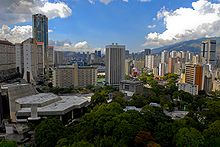
Under the Köppen climate classification, Caracas has a tropical savanna climate (Aw). Caracas is also intertropical, with precipitation that varies between 900和1,300毫米(35和51英寸) (annual), in the city proper, and up to 2,000毫米(79英寸) in some parts of the Mountain range. While Caracas is within the tropics, due to its altitude temperatures are generally not nearly as high as other tropical locations at sea level. The annual average temperature is approximately 23.8 °C(75 °F), with the average of the coldest month (January) 22.8 °C(73 °F) and the average of the warmest month (July) 25.0 °C(77 °F), which gives a small annual thermal amplitude of 2.2 °C(4.0 °F). In the months of December and January abundant fog may appear, in addition to a sudden nightly drop in temperature, until reaching 8 °C(46 °F).[11] This peculiar weather is known by the natives of Caracas as the Pacheco. In addition, nightly temperatures at any time of the year are much (14 to 20 °C) lower than daytime highs and usually do not remain above 24 °C(75 °F), resulting in very pleasant evening temperatures. Hail storms appear in Caracas, although only on rare occasions. Electrical storms are much more frequent, especially between June and October, due to the city being in a closed valley and the orographic action of Cerro El Ávila.
| 月份 | 1月 | 2月 | 3月 | 4月 | 5月 | 6月 | 7月 | 8月 | 9月 | 10月 | 11月 | 12月 | 全年 |
|---|---|---|---|---|---|---|---|---|---|---|---|---|---|
| 历史最高温 °C(°F) | 31.9 (89.4) |
34.1 (93.4) |
35.3 (95.5) |
33.5 (92.3) |
34.4 (93.9) |
32.8 (91.0) |
33.6 (92.5) |
31.5 (88.7) |
32.2 (90.0) |
31.4 (88.5) |
31.2 (88.2) |
30.8 (87.4) |
35.3 (95.5) |
| 平均高温 °C(°F) | 23.3 (73.9) |
23.6 (74.5) |
24.3 (75.7) |
25.0 (77.0) |
25.8 (78.4) |
26.0 (78.8) |
25.5 (77.9) |
25.8 (78.4) |
25.5 (77.9) |
25.2 (77.4) |
24.6 (76.3) |
23.8 (74.8) |
24.9 (76.8) |
| 日均气温 °C(°F) | 19.6 (67.3) |
19.7 (67.5) |
20.2 (68.4) |
21.2 (70.2) |
22.0 (71.6) |
22.0 (71.6) |
21.7 (71.1) |
21.9 (71.4) |
21.9 (71.4) |
21.8 (71.2) |
21.3 (70.3) |
20.2 (68.4) |
21.1 (70.0) |
| 平均低温 °C(°F) | 15.9 (60.6) |
15.8 (60.4) |
16.0 (60.8) |
17.5 (63.5) |
18.2 (64.8) |
18.1 (64.6) |
17.9 (64.2) |
18.1 (64.6) |
18.3 (64.9) |
18.4 (65.1) |
18.0 (64.4) |
16.5 (61.7) |
17.4 (63.3) |
| 历史最低温 °C(°F) | 10.0 (50.0) |
10.9 (51.6) |
11.4 (52.5) |
12.5 (54.5) |
13.1 (55.6) |
14.9 (58.8) |
14.1 (57.4) |
14.3 (57.7) |
15.5 (59.9) |
13.1 (55.6) |
11.9 (53.4) |
10.0 (50.0) |
10.0 (50.0) |
| 平均降雨量 mm(英寸) | 15.3 (0.60) |
13.2 (0.52) |
11.4 (0.45) |
59.2 (2.33) |
81.7 (3.22) |
134.1 (5.28) |
118.4 (4.66) |
123.8 (4.87) |
115.4 (4.54) |
126.3 (4.97) |
72.6 (2.86) |
41.4 (1.63) |
912.8 (35.94) |
| 平均降雨天数(≥ 1.0 mm) | 6 | 4 | 3 | 7 | 13 | 19 | 19 | 18 | 15 | 15 | 13 | 10 | 142 |
| 平均相對濕度(%) | 73.7 | 74.2 | 73.0 | 76.3 | 75.4 | 75.1 | 74.1 | 74.0 | 74.9 | 74.7 | 73.7 | 74.7 | 74.5 |
| 月均日照時數 | 229.4 | 217.5 | 235.6 | 183.0 | 182.9 | 183.0 | 210.8 | 217.0 | 213.0 | 210.8 | 210.0 | 213.9 | 2,506.9 |
| 数据来源1:Instituto Nacional de Meteorología e Hidrología (INAMEH)[12][13] | |||||||||||||
| 数据来源2:World Meteorological Organization (rainfall data),[14] Hong Kong Observatory (sun only),[15] NOAA(extremes)[16] | |||||||||||||
人口
[编辑]根據2011年調查,卡拉卡斯行政區的人口超過三百萬人,[17] 全都會區人口約為540萬人。人口組成主要為來自西班牙、義大利、德國、葡萄牙的移民及其後裔。也有許多敘利亞及黎巴嫩裔的人口。[17][18]
犯罪
[编辑]委內瑞拉是全世界謀殺率最高的國家,卡拉卡斯是全世界謀殺率最高的城市。大部分的謀殺與其他暴力犯罪都不會破案。卡拉卡斯周圍山丘上的貧窮社區非常危險。[19][20][21] 2012年, 卡拉卡斯被認為是全世界第三危險的城市,謀殺率為每 100,000 人 119 次。
Landmarks
[编辑]







Federal Capitol
[编辑]The Federal Capitol occupies an entire city block, and, with its golden domes and neoclassical pediments, can seem even bigger. The building was commissioned by Antonio Guzmán Blanco in the 1870s, and is most famous for its Salón Elíptico, an oval hall with a mural-covered dome and walls lined with portraits of the country's great and good. The nearby Palacio Municipal de Caracas dating from 1696 was renovated in the Neoclassical style in 1906 and now serves as the city hall and the Caracas Museum.[22]
East Park
[编辑]The Caracas East Park (Parque del Este, now officially Parque Generalísimo Francisco de Miranda) was designed by Brazilian architect Roberto Burle Marx. It is a green paradise in the middle of the city, and it contains a small zoo. A replica of the ship led by Francisco de Miranda, the Leander, is being built in the southern part of the park. Before there used to exist a replica of the Santa Maria ship, used by Christopher Colombus in his voyages to America.
Teresa Carreño Cultural Complex
[编辑]The Teresa Carreño Cultural Complex (Complejo Cultural Teresa Carreño), or more commonly the Teresa Carreño Theatre (Teatro Teresa Carreño), is by far the most important theater of Caracas and Venezuela. The theater presents symphonic and popular concerts, operas, ballet, and dramatic works. It is the second largest theater in South America, after the Teatro Colón of Buenos Aires, Argentina.
Simon Bolivar birthplace house
[编辑]Skyscrapers may loom overhead, but there is more than a hint of original colonial flavor in this neatly proportioned reconstruction of the house where Simon Bolivar was born on 24 July 1783. The museum's exhibits include period weapons, banners and uniforms.
Much of the original colonial interior has been replaced by monumental paintings of battle scenes, but more personal relics can be seen in the nearby Bolivarian museum. The pride of the place goes to the coffin in which Bolivar's remains were brought from Colombia; his ashes now rest in the National Pantheon.
National Pantheon
[编辑]Venezuela's most venerated building is five blocks north of Plaza Bolívar, on the northern edge of the old town. Formerly a church, the building was given its new purpose as the final resting place for eminent Venezuelans by Antonio Guzmán Blanco in 1874.
Parque Central Complex
[编辑]At a short distance east of Plaza Bolívar is Parque Central, a concrete complex of five high-rise residential slabs of somewhat apocalyptic-appearing architecture, crowned by two 56-storey octagonal towers, one of them is under repair due to the fire which burnt the building on 17 October 2004.
Parque Central is Caracas' art and culture hub, with museums, cinemas and the Teresa Carreño Cultural Complex. The West Tower balcony, on the 52nd floor, gives a 360° bird's-eye view of Caracas.
Public squares
[编辑]- Plaza Bolívar is the focus of the old town with the monument to El Libertador, Simon Bolívar, at its heart. Modern high-rise buildings have overpowered much of the colonial flavor of Caracas' founding neighbourhood.
- Plaza Venezuela is the geographic center of Caracas. It is a large urban plaza at the entrance of the Central University of Venezuela. Kinetic artists have displayed their works there, including Carlos Cruz-Diez, Alejandro Otero and Jesus Soto. East of the Plaza is the Plaza Venezuela Fountain, a large computerized display of water, music and colored light refurbished in 2009 to include the latest available technology.[23]
- Plaza Caracas was constructed in 1983. It is in the Simón Bolívar Center.
- Plaza San Jacinto dates to 1603 and used to be the site of the city market
El Hatillo
[编辑]El Hatillo is a colonial town that is located at the south-east suburbs of Caracas in the municipal area of the same name. This small town, which is one of Venezuela's few well-preserved typical colonial areas, gives an idea of what Caracas was like in centuries past.
Cerro El Ávila
[编辑]Cerro El Ávila (Mountain El Ávila) (Indigenous name: Waraira Repano), is a mountain in the mid-North of Venezuela. It rises next to Caracas and separates the city from the Caribbean Sea. It is considered the lungs of Caracas because there is a lot of vegetation on it.
Las Mercedes
[编辑]This zone contains restaurants with varied gastronomical specialties, along with pubs, bars, pools and art galleries.
Altamira neighborhood
[编辑]Altamira is a neighborhood in the Chacao municipality of Caracas. It has its own Metro Station, many hotels, malls and restaurants, and is an important business and cultural centre. The Francisco de Miranda avenue (a major avenue in Caracas) and the Distibuidor Altamira (a congested highway exit) are both in Altamira.
Religious buildings
[编辑]The Iglesia de San Francisco is of historical value. Bolívar's funeral was held here twelve years after his death. Here he was proclaimed Libertador in 1813 by the people of Caracas. The church has gilded baroque altarpieces, and retains much of its original colonial interior, despite being given a treatment in the 19th century under the auspices of Antonio Guzmán Blanco, which was intended to be modernizing.[來源請求] It contains some 17th century masterpieces of art, carvings, sculptures and oil paintings. The Central University of Venezuela, established during the reign of Philip V, was lodged for centuries in the church cloisters next door, which today are the seat of the Language Academy, and the Academies of History, Physics, and Mathematics.
Caracas Cathedral is the seat of the Roman Catholic Archdiocese of Caracas.
The Mosque of Sheikh Ibrahim Al-Ibrahim is the second largest mosque in Latin America. For many years it was the biggest.[24]
The Union Israelita de Caracas is the biggest Synagogue for the Jewish Ashkenazi community in Caracas. Its mission is to host the religious services and preserve the memory of the Jewish heritage in Venezuela. Similarly, Mariperez is the biggest Synagogue for the Jewish Sephardic community in Caracas.
Colleges, universities and international schools
[编辑]Central University of Venezuela
[编辑]The Central University of Venezuela (Universidad Central de Venezuela in Spanish) is a public University. Founded in 1721, it is the oldest university in Venezuela and one of the first in Latin America.[來源請求] The university campus was designed by architect Carlos Raúl Villanueva and it was declared World Heritage by UNESCO in 2000. The Ciudad Universitaria de Caracas, as the main Campus is also known, is considered a masterpiece of architecture and urban planning and it is the only university campus designed in the 20th century that has received such recognition by UNESCO.[來源請求]


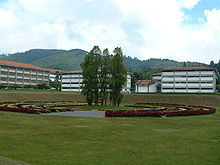

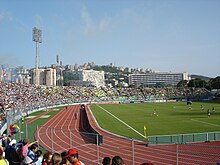
Simón Bolívar University
[编辑]The Simón Bolívar University (Universidad Simón Bolívar, in Spanish, or USB) is a public institution in Caracas that focuses on science and technology. Its motto is "La Universidad de la Excelencia" ("University of Excellence").
Other universities
[编辑]- Academia Militar de Venezuela
- Escuela de Formacion de Oficiales de las Fuerzas Armadas de Cooperación
- Universidad Alejandro de Humboldt
- Universidad Bolivariana de Venezuela
- Universidad Católica Andrés Bello
- Universidad Experimental Politécnica Antonio José de Sucre
- Universidad José María Vargas
- Universidad Metropolitana
- Universidad Monteavila
- Universidad Nacional Experimental de las Fuerzas Armadas (UNEFA)
- Universidad Nacional Experimental Simón Rodríguez
- Universidad Nueva Esparta
- Universidad Pedagógica Experimental Libertador
- Universidad Santa Maria
International schools
[编辑]- British School of Caracas
- Colegio Internacional de Caracas
- Escuela Campo Alegre
- International Christian School
Sports
[编辑]There are professional Association Football, baseball and several other sports.
Professional teams include Deportivo Petare, Caracas Fútbol Club, SD Centro Italo Venezolano, Estrella Roja FC and Real Esppor Club. The Deportivo Petare has reached the semifinals of international tournaments, such as the Copa Libertadores de America, while the Caracas Fútbol Club has reached the quarterfinals.
Baseball teams Tiburones de La Guaira and Leones del Caracas play in the Estadio Universitario de la UCV, of the Central University of Venezuela, with a capacity of 26,000 spectators.
Another baseball team started in Caracas: the Navegantes del Magallanes. It was moved to Valencia, Carabobo in the 1970s.
Association Football stadiums include:
- Estadio Olímpico de la UCV, with capacity of 30 000 spectators is seat of the Deportivo Italia and Caracas Fútbol Club.
- Brígido Iriarte stadium, with a capacity of 12 000 spectators (old seat of the Deportivo Italia and Caracas Fútbol Club, and seat of the Estrella Roja FC). The Caracas Fútbol Club opened its own stadium in 2005, Campo Deportivo Cocodrilos.
- Cocodrilos de Caracas plays in the Venezuelan professional basketball league. They play their games in the "Gimnasio José Beracasa" in the neighbourhood of El Paraíso.
Caracas is the seat of the National Institute of Sports and of the Venezuelan Olympic Committee.
Caracas hosted the 1983 Pan American Games.
Teams
[编辑]- Association Football: Caracas Fútbol Club, Deportivo Petare, Atletico Venezuela, Estrella Roja Futbol club, Real Esppor Club.
- Baseball: Tiburones de la Guaira, Leones del Caracas.
- Basketball: Cocodrilos de Caracas.
Culture
[编辑]
Caracas is Venezuela's cultural capital, with many restaurants, theaters, museums, and shopping centers. The city is home to an array of immigrants from but not limited to: Spain, Italy, Portugal, the Middle East, Germany, China, and Latin American countries.[25][26][27][28]
Gastronomy
[编辑]Caracas has a gastronomical heritage due to the influence of immigrants, leading to a choice of regional and international cuisine.[來源請求] There are a variety of international restaurants including American, French, Lebanese, Italian, Spanish, Indian, Chinese, Peruvian, Japanese, Mediterranean and Mexican. The district of La Candelaria contains Spanish restaurants, resulting from Galician and Canarian immigrants that came to the area in the mid-20th century.
Gallery
[编辑]-
Federation Arch
-
Jardín Lumínico of Patricia Van Dalen
-
Museum of Contemporary Art
-
Parque Cristal building
-
Plaza Francia (France Square)
-
Social Action Center for Music
Notable natives
[编辑]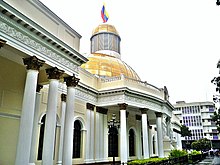



Caracas has been the birthplace of many politicians, scientists, sportsman and artists that notably shaped the country's history and culture:
- Aldemaro Romero Jr.
- Alfredo Sadel
- Ali Lenin Aguilera
- Andrés Bello
- Antonio Bienvenida
- Alfonso Carrasquel
- Andrés Galarraga
- Antonio Aranguren
- Antonio Guzmán Blanco
- Antonio Ladislao Alcantara
- Aquiles Nazoa
- Armando Reverón
- Arturo Uslar-Pietri
- Astrid Carolina Herrera - Miss Venezuela World 1984, Miss World 1984
- Barbara Palacios Teyde - Miss Venezuela 1986, Miss Universe 1986
- Baruj Benacerraf- shared the 1980 Nobel Prize in Physiology.
- Carlos Cruz-Diez
- Carlos Delgado Chalbaud
- Carlos Lavado
- Carlos Morocho Hernandez
- Cesar Baena
- César Girón
- César Tovar
- Daniel Dhers
- Danny Alves
- Daniella Isamit Morales
- Dayana Mendoza - Miss Venezuela 2007, Miss Universe 2008
- Enzo Potolicchio
- Felipe Larrazabal- politician, musician
- Fermín Toro
- Fernando Paz Castillo
- Francisco de Miranda
- Francisco Herrera Luque
- Francisco Massiani
- Francisco Rodriguez
- Gabriela Montero
- Gilberto Rodríguez
- Greivis Vasquez
- Irene Saez - Miss Venezuela 1981, Miss Universe 1981
- Isaac J Pardo
- Jacinto Convit
- Jacobo Borges
- Johnny Cecotto
- Jorge Blanco
- Jorge Liberato Urosa Savino
- José Ángel Lamas
- José Antonio Calcaño
- José Manuel Hernández
- Juan Antonio Pérez Bonalde
- Juan Bautista Plaza
- Juan Pablo Pérez Alfonso
- Juan Vicente Torrealba
- Lorenzo Herrera
- Lorenzo Mendoza
- Luis Avilan
- Majandra Delfino
- Manuel Blum
- Marcel Roche
- Mariano Montilla
- Maritza Sayalero - Miss Venezuela 1979, Miss Universe 1979
- Martín Tovar y Tovar
- Maye Brandt
- Narciso López
- Omar Vizquel
- Oscar D'León
- Pedro Gual
- Rafael Alfonzo Ravard
- Reynaldo Hahn
- Stefanía Fernández - Miss Venezuela 2008, Miss Universe 2009
- Rudy Márquez
- Serge Blanco
- Simón Bolívar
- Simón Rodríguez
- Teresa Carreño
- Tina Ramirez
- Vicente Nebrada
- Yucef Merhi
- Gabriela Isler - Miss Venezuela 2012, Miss Universe 2013
Transportation
[编辑]
- The Caracas Metro has been in operation since 27 March 1983. With 4 lines, 47 stations and about 10 more to be constructed. It covers a great part of the city and also has an integrated ticket system that combines the route of the Metro with those offered by the Metrobús, a bus service of the Caracas Metro. In 2010, the first segment of a new ariel cable car system opened, Metrocable[29] which feeds into the larger metro system.
- Buses are the main means of mass transportation. There are two bus systems: the traditional system and the Metrobús. The traditional system runs a variety of bus types, operated by several companies on normal streets and avenues:
- Autobus; large buses.
- Camioneta; medium size buses.
- microbus or camionetica; vans or minivans.
- IFE; train services to and from Tuy Valley cities of Charallave and Cúa.
- Simón Bolívar International Airport, the biggest and most important in the country is located outside the city, roughly 32公里(20英里) from the downtown area.
- Caracas Aerial Tramway
- The Los Teques Metro is a suburban mass-transit system completed in 2006 that connects Caracas with the suburban city of Los Teques.
- In March 2009 four of the five Caracas districts launched Plan Vía Libre to reduce traffic (the pro-Chavez Jorge Rodríguez' Libertador District is currently not cooperating as the other districts are in the hands of the opposition[30]). On each weekday, cars with certain number plates are banned from entering key parts of the city centre; the numbers rotate so that any particular car is banned one day a week.[31]
- Generalisimo Francisco de Miranda airbase used by military aviation and govern aeroplane.
International relations
[编辑]Caracas is twinned with:
|
|
|
Districts
[编辑]See also
[编辑]- 1641 Caracas earthquake
- 1967 Caracas earthquake
- Greater Caracas
- Large Cities Climate Leadership Group
- List of metropolitan areas of Venezuela
- Venezuela International Book Fair
Notes
[编辑]- ^ 1.0 1.1 Cabildo Metropolitano (PDF). [7 October 2014].
- ^ 2.0 2.1 Caracas. Caracas.eluniversal.com. [30 April 2010].
- ^ John Lombardi, Venezuela, Oxford, England, 1982, p 72.
- ^ George Somers, Amyas Preston and the Burning of Caracas. The Bermudian.
- ^ Maurice Wiesenthal, The History and Geography of a Valley, 1981.
- ^ Sitio Web PDVSA. Pdvsa.com. [26 June 2010].
- ^ Petróleos de Venezuela S.A.. PDVSA. [26 June 2010].
- ^ CIA - The World Factbook. Cia.gov. [16 March 2012].
- ^ The Online Journal of McKinsey & Company. McKinsey Quarterly. [12 March 2013].
- ^ http://icsc.un.org/resources/pdfs/2009/pp/Venezuela-09.pdf
- ^ Weather Base – World Weather – Average Conditions – Caracas. BBC. [28 July 2013].
- ^ Estadísticos Básicos Temperaturas y Humedades Relativas Máximas y Mínimas Medias (PDF). INAMEH. [31 July 2012] (Spanish).
- ^ Estadísticos Básicos Temperaturas y Humedades Relativas Medias (PDF). INAMEH. [31 July 2012] (Spanish).
- ^ World Weather Information Service - Caracas. World Meteorological Organization. [16 October 2012].
- ^ Climatological Information for Caracas, Venezuela. Hong Kong Observatory. [16 October 2012].
- ^ Caracas-La-Carlota Climate Normals 1961-1990. National Oceanic and Atmospheric Administration. [15 January 2013].
- ^ 17.0 17.1 http://www.ine.gov.ve/documentos/Demografia/CensodePoblacionyVivienda/pdf/distrito_capital.pdf
- ^ http://www.ine.gov.ve/documentos/Demografia/CensodePoblacionyVivienda/pdf/miranda.pdf
- ^ Venezuela, crime. U.S. Department of State. [11 September 2011].
- ^ Barry Wigmore. Caracas in Venezuela tops list of murder capitals of the world. Daily Mail. UK. 30 September 2008 [11 September 2011].
- ^ Venezuelan Politics and Human Rights. Robert Samet, Stanford. [17 August 17].
- ^ "Palacio Municipal de Caracas", EcuRed. (西班牙文) Retrieved 20 May 2013.
- ^ (西班牙文) VTV Noticias Con gran explosión de luz, sonido y movimiento fue reinaugurada fuente de Plaza Venezuela. vtv.gov.ve. [13 December 2009].
- ^ The New York Times/ Brooke, James. Caracas Getting Continent's Biggest Mosque. The New York Times. 3 January 1993 [13 December 2009].
- ^ Ingham, James. Americas | Airships to tackle Caracas crime. BBC News. 20 April 2007 [7 July 2009].
- ^ Venezuela. Travel.state.gov. [7 July 2009].
- ^ Venezuela Warnings or Dangers – Travel Guide. VirtualTourist.com. [7 July 2009].
- ^ Feinman, Sacha. Crime and class in Caracas. – By Sacha Feinman – Slate Magazine. Slate.com. 27 November 2006 [7 July 2009].
- ^ Caracas Metro Cable
- ^ Gabriel, George. Discourse and Division in Venezuela. venezuelanalysis.com. [7 July 2009].
- ^ (西班牙文) Noticias24, 1 March 2009, Mañana comienza el “Plan Vía Libre” para combatir las colas en Caracas
- ^ Sister Cities of Istanbul. [1 July 2009].
- ^ Erdem, Selim Efe. İstanbul'a 49 kardeş. Radikal. 1 July 2009 [22 July 2009] (Turkish).
49 sister cities in 2003
- ^ Madrid city council webpage Mapa Mundi de las ciudades hermanadas 请检查
|url=值 (帮助). Ayuntamiento de Madrid. [22 July 2009]. - ^ Twin towns and Sister cities of Minsk [via WaybackMachine.com]. The department of protocol and international relations of Minsk City Executive Committee. [21 July 2013]. (原始内容存档于2 May 2013) (Russian).
- ^ Town Twinning Agreements. Municipalidad de Rosario - Buenos Aires 711. [2014-10-14].




